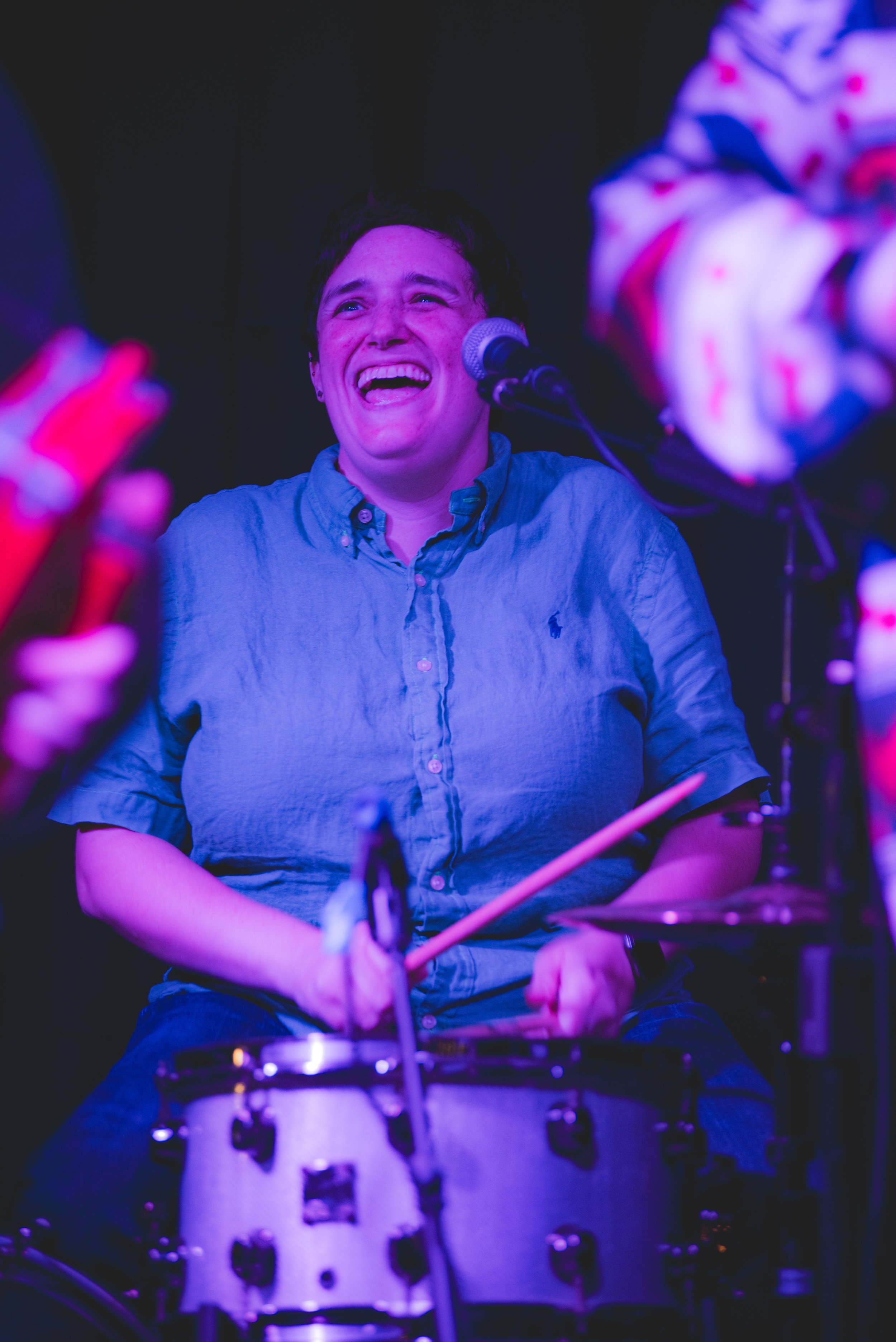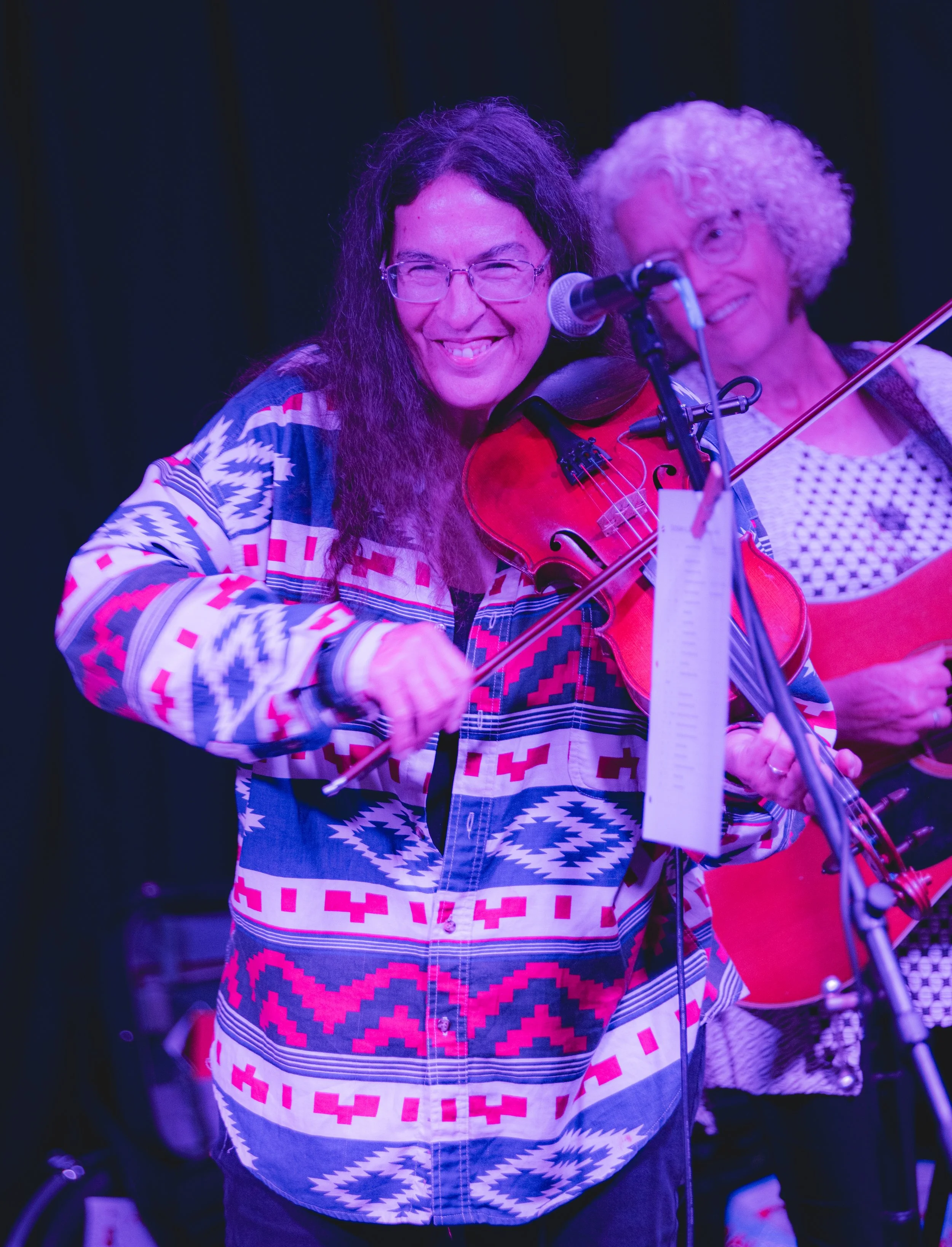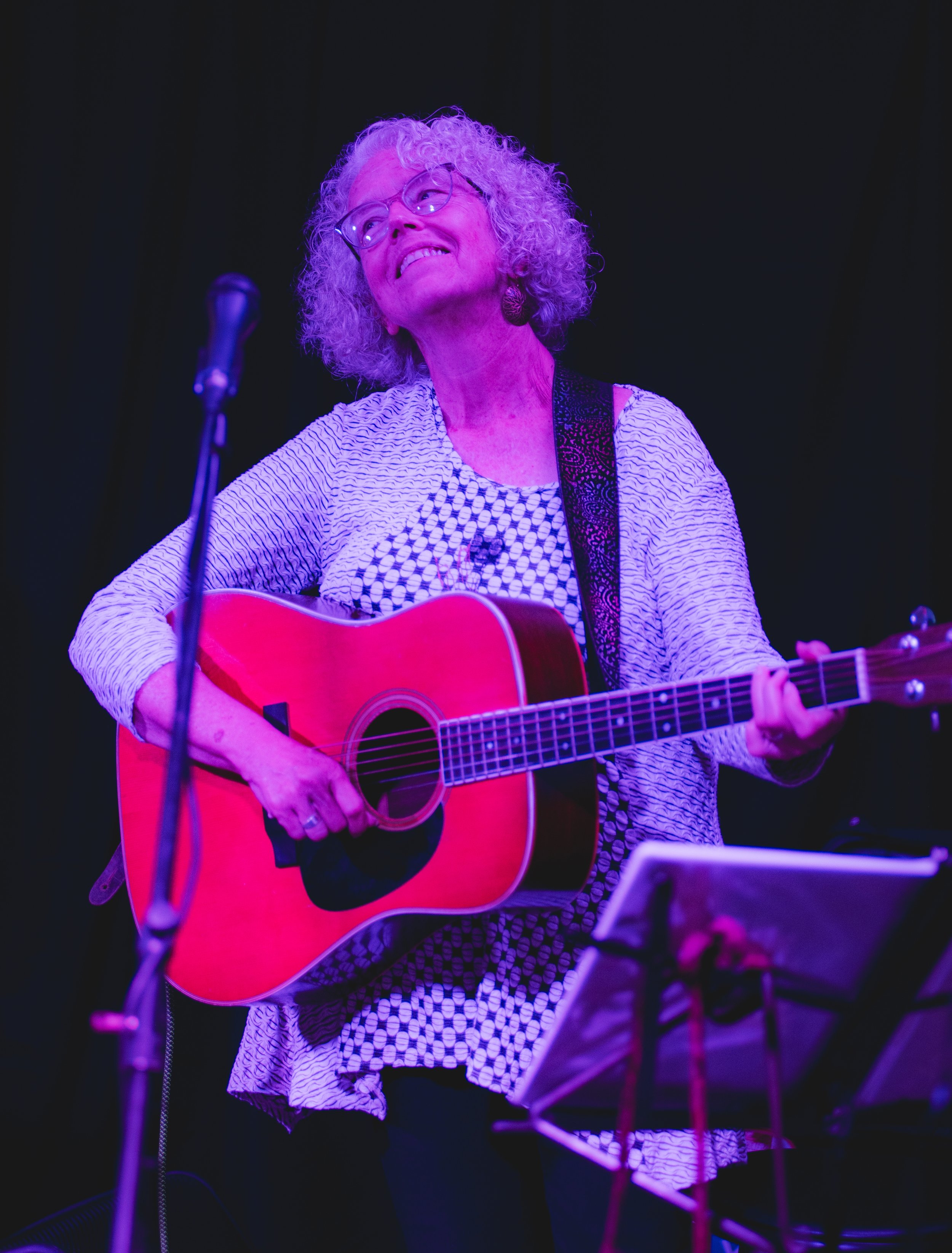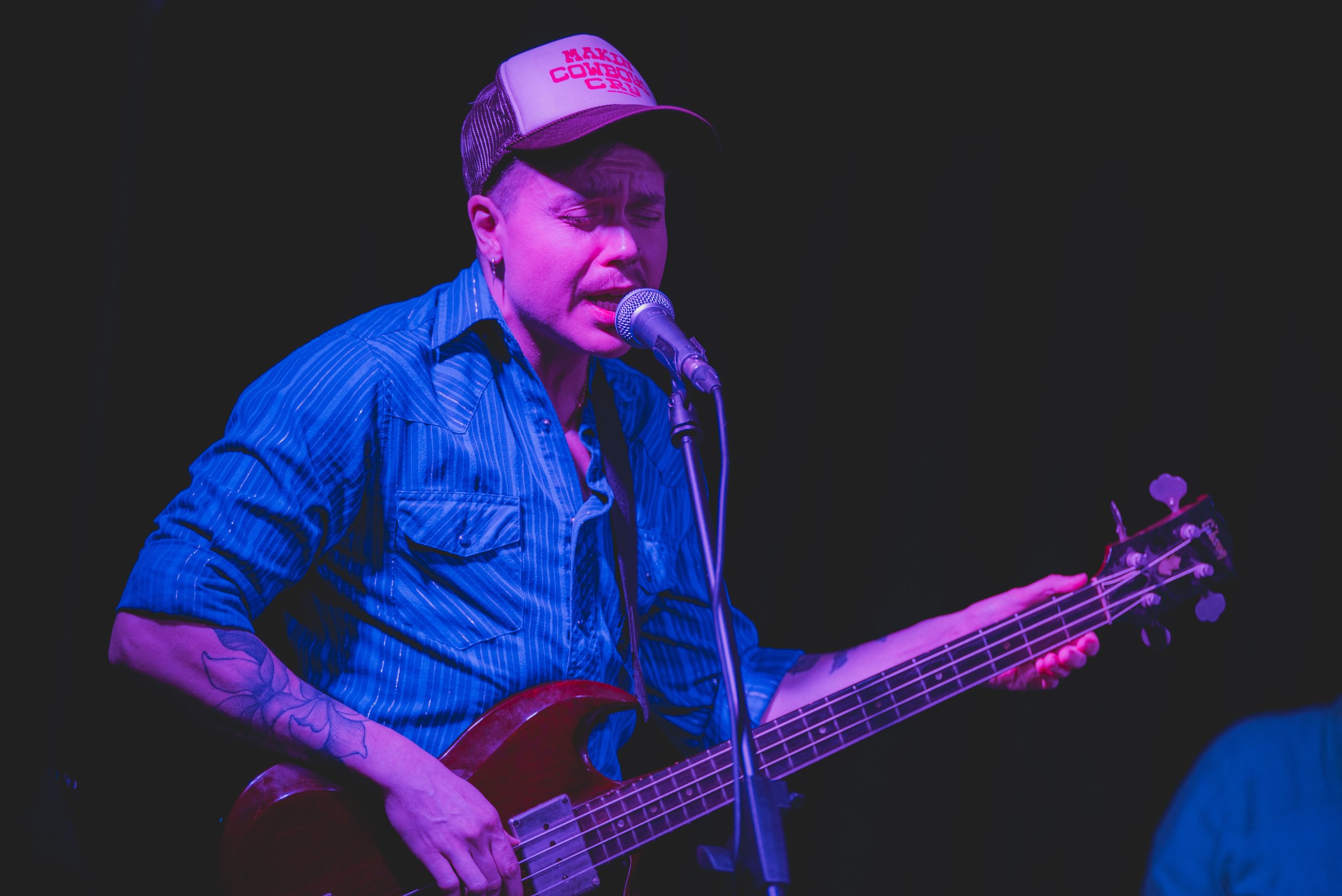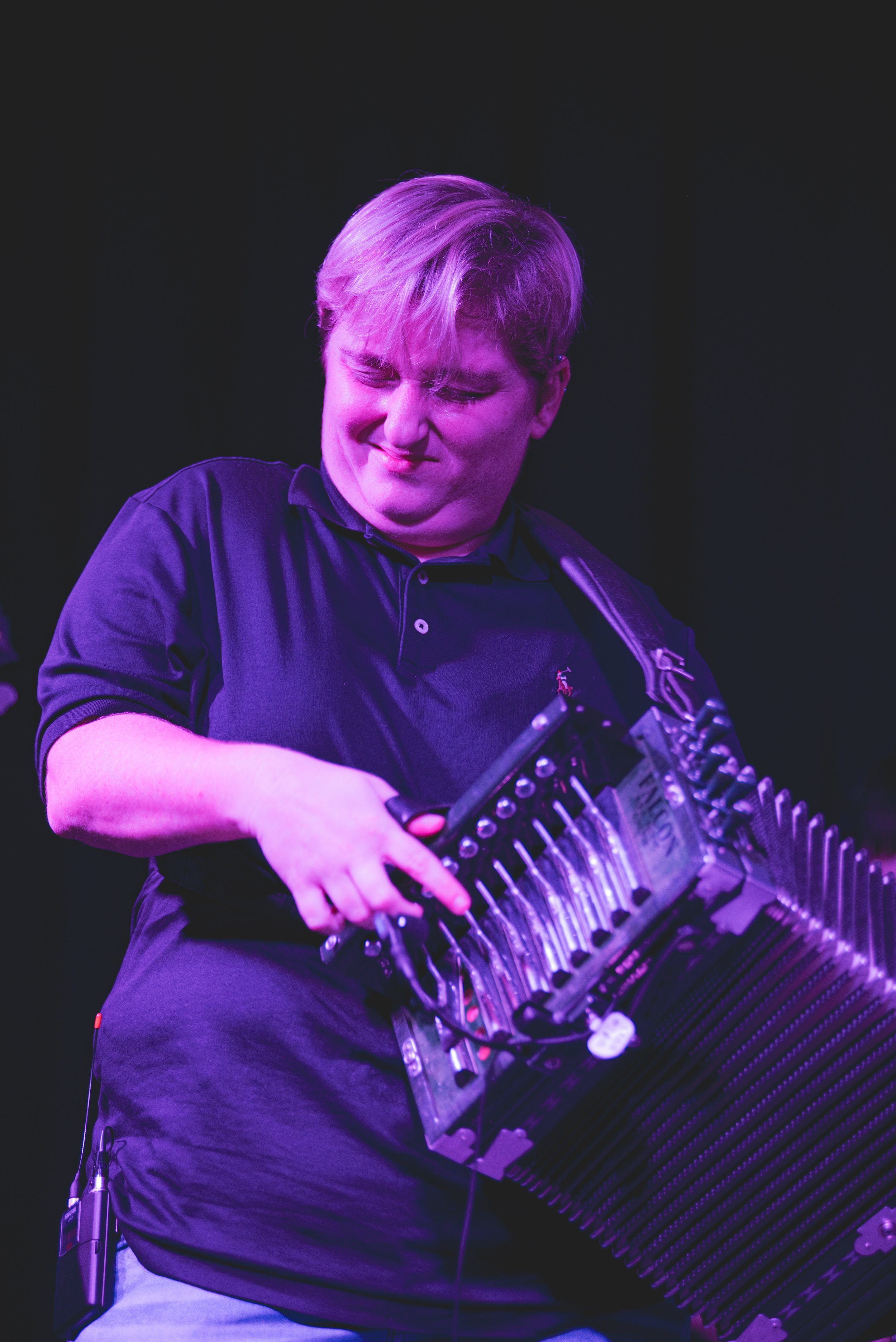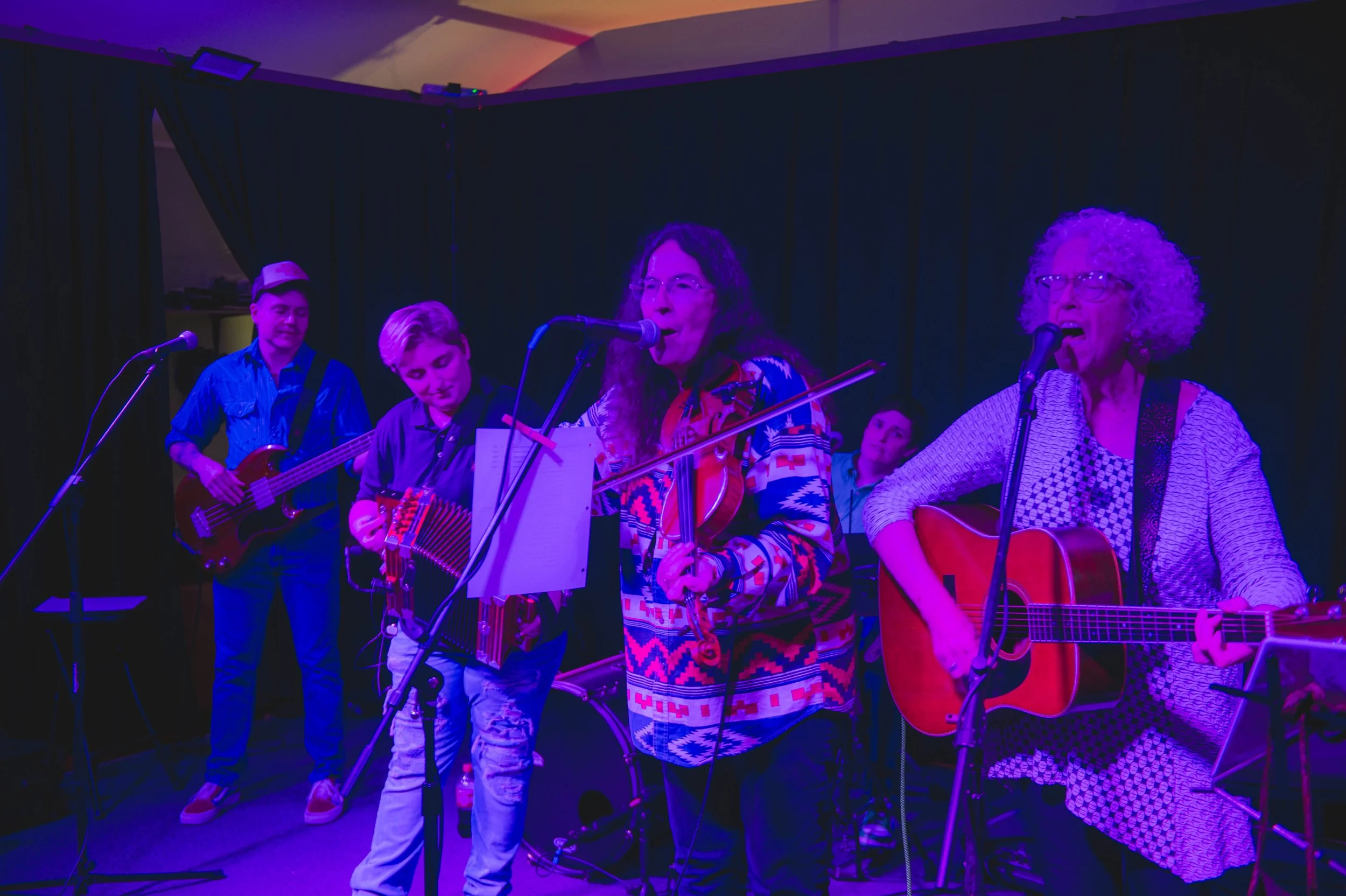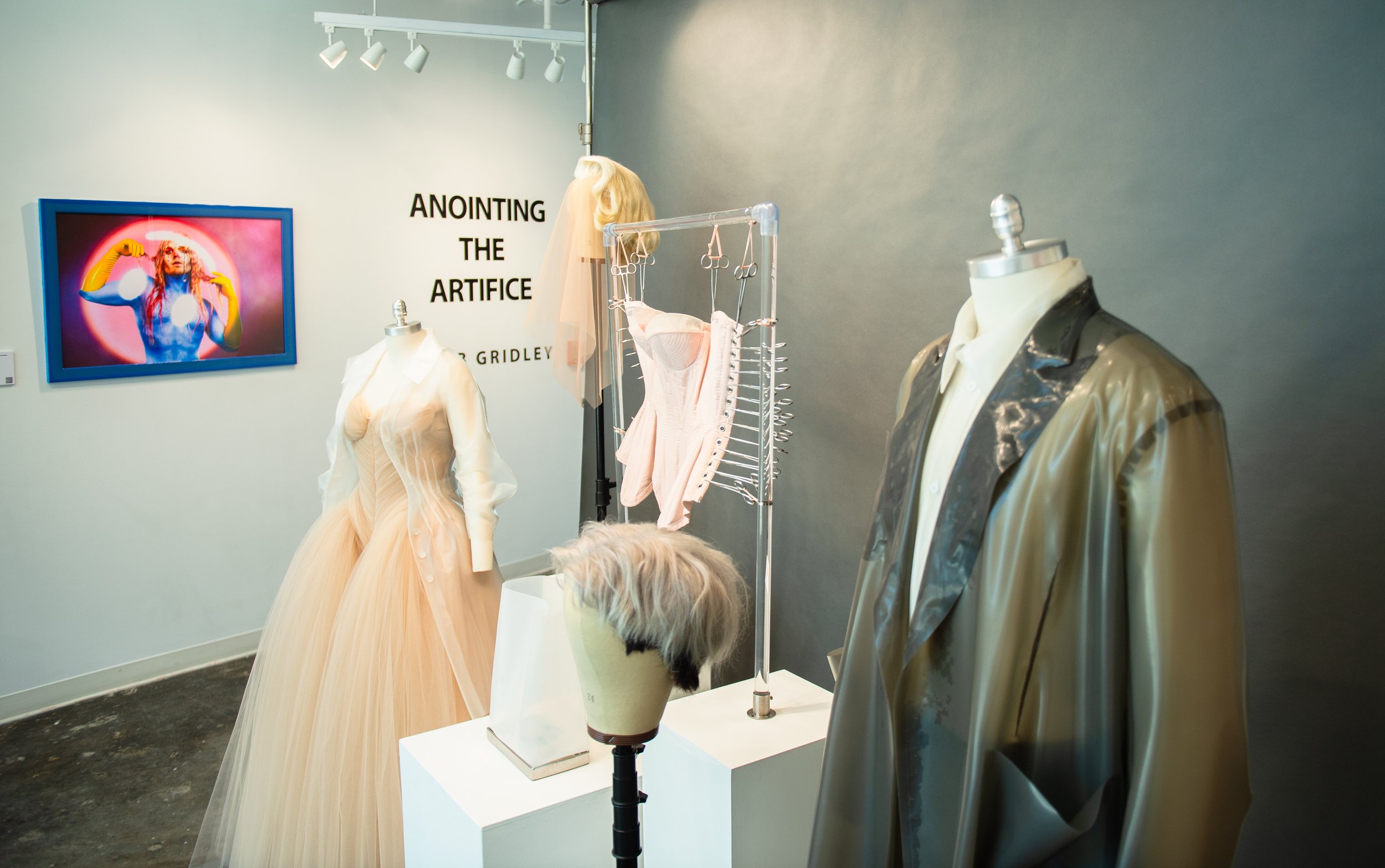capturing moments, curating experiences, & creating community.
Charlie Champagne is a Creative entrepreneur passionate about photography & design, event production, and community collaboration.
Catharsis Within The Collision of Cajun Culture & Queer Eutopia
On Friday, October 4, 2024, the Acadiana Queer Collective & the LSU Department of French Studies, collaborated on a Queer Cajun Music Showcase, in honor of LGBTQ+ History Month, at Hideway Hall in Lafayette, Louisiana.
Photography & Documentation by Charlie Champagne, 2024
On Friday, October 4, 2024, the Acadiana Queer Collective & the LSU Department of French Studies, collaborated on a Queer Cajun Music Showcase, in honor of LGBTQ+ History Month, at Hideway Hall in Lafayette, Louisiana.
This event was more than just a zydeco music showcase. It was a night of catharsis for all of the queer people in the room, especially those who grew up in Acadiana.
As for myself, growing up in New Iberia as a queer kid, was both confusing and intimidating at times. Growing up, we were taught to love, respect, and help one another. But why was that different for those who were LGBTQ? Why did I NEVER see people like me growing up? Where were they hiding, and why?
Meagan Benoit / Percussion / Mandolin / Singer
In all of my memories of attending festivals, concerts, and fais do-do’s, I almost never saw queer couples on the dance floor. If you did, they were most likely older and people would just say they were “friends” or the good old-fashioned “roommates” cover-up. It was rare to see LGBTQ+ couples celebrating their love publicly. So, to have a night dedicated to not only providing a safe space for queer people to gather, but to celebrate the Queer and Cajun musicians as well, was incredibly special. In my 32 years of being both Queer and Cajun, this was the first night where both identities were able to co-exist and be celebrated.
Gina Forsyth / Fiddle / Singer / Songwriter
Jan Boney / Guitar / Vocalist
People underestimate the importance of visibility.
Those who exist in the heteronormative world, are blind to their privilege of being able to exist in a world where they see versions of themselves every day. Their identity isn’t questioned on a daily basis, and their existence doesn’t challenge local dogma or religious principles.
People don’t realize the commonality that both Queer culture and Cajun culture share. Both identities carry rich histories of resilience, cultural expression, and resistance to marginalization. Though each group may have its nuances, their stories reflect the universal human drive for dignity, identity, and belonging.
Sam Wrobel / Bass / Vocalist
Rosemary Benoit / Accordion / Fiddle
Cajun culture focuses on preserving history and tradition, while queer culture often pushes against traditional boundaries to create new possibilities. However, both are marked by historical oppression, the experience of being an outsider, and the power found in communal bonds. These identities, in their own ways, both honor their histories while continuing to resist cultural erasure and find joy and strength in their unique paths.
Both Cajun and Queer identities revolve around community, resilience, and the strength of being different.
please enjoy the full photo gallery below
The Mission of the Acadiana Queer Collective is “to provide opportunities for queer people of Acadiana to show up for one another and promote the positive visibility of queer people throughout the community.”
Counteracting Censorship through Conceptual Creativity
The Free Pages Project, a nonprofit initiative fighting national book-bans in the US via conceptual and functional sculptural pop-up libraries.
Monthly Q&A / September / 2024
The Free Pages Project, by Alex Smith, documented by Charlie Champagne
This month, I re-connected with my friend Alex Jacobs to see how grad school had been treating them, and to learn more about their exciting thesis, The Free Pages Project - a nonprofit initiative fighting nationwide book-bans through conceptual & functional art.
Alex is originally from St. Louis, Missouri, and is currently enrolled in the LSU Art & Design Graduate Program for Sculpture. Their work currently focuses on the conceptual nature of identity, gender expression, and representation.
Alex Jacobs / photographed by Charlie Champagne / Louisiana State University / 2024
So tell me more about what inspired this project?
Alex: “In my work, I focus on the concepts of gender-identity, gender-expression, and representation. While I was trying to decide where to focus for my thesis project, I couldn’t help but notice the recent legislation of book-bans that have been popping up all over the United States — and in the realm of representation, these bans really hit home for me.
The idea really stemmed from listening to a podcast that mentioned Magnus Hirschfeld. He was a queer and jewish man, who was born in the 1800s. He was a sexologist and researcher, pre-Kinsey. When you see pictures of Nazis burning books, there were from his entire library. All of his documented queer oral histories and stories of queer culture had been lost. I see today’s current book bans as an extension of that same mechanism that consistently attempts to erase our stories & narratives — in an attempt to white-wash American history.
via Shutterstock / Thousands of books smolder in a Nazi bonfire, 1933. The burnings were conducted by the German Student Association of Nazi Germany.
And it’s not just queer people, it’s people-of-color, women, etc. These people imposing these book bans just want some sanitized version of American history that they don’t have to feel bad about, when in reality, it’s much more colorful.”
How have these feelings helped fuel and manifest the concept for The Free Pages Project?
Alex: “In response to all of that stimuli, I started creating structures that could hold these banned books, similar to Little Book Libraries. I am currently wanting to use private spaces to house these unique and creative pop-up libraries to allow these books to be accessible to the public. If these stories are taken off shelves, then that representation disappears, especially in places where they are needed the most.”
Alex: “These legislative bodies and school boards, all seem to copy one-another. This is how they seem to spread before they become a national or federal rule, they pop-up in local governments. As small as a little town, county, or parish, and eventually spread across the entire state.
Charlie: Have you been keeping up with book-bans here in Louisiana?
Alex: Thankfully, Louisiana right now only has under 10 official challenged and banned books, but if I had to guess with the current state legislation, that may begin to increase within the next few years.”
Over 10,000 books were banned in public schools during the 2023-2024 school year, according to PEN America’s preliminary findings.
“This dramatic increase is nearly triple the number from the previous school year, when PEN America recorded 3,362 bans nationwide. The final count for the 2023-2024 school year will be released later this fall along with a public Index of School Book Bans. PEN America will also release a detailed content analysis of titles banned during the 2023-2024 school year.” ”
When it comes to representation, it’s pretty understood that if you don’t see yourself in the media you consume, that’s when you start to think things like, “So, am I abnormal? This isn’t something other people experience?”
The Free Pages Project is dedicated to freedom of expression and the richness of diverse literature through our mission to counteract censorship. By constructing unique sculptural community libraries, we provide access to books banned in schools and community libraries across the United States.
Our commitment lies in fostering community engagement, activism, and literacy. We believe in the transformative power of diverse voices and stories, and through our innovative approach combining art and activism, we strive to educate, enlighten, and empower individuals and communities nationwide.
Alex Jacobs / photographed by Charlie Champagne / Louisiana State University / 2024
Contact The Free Pages Project & Learn More about the project by visiting www.thefreepagesproject.com
Intersecting Lines, Handpoke Tattooing & Queer Authenticity
Intersecting Lines, Handpoke Tattooing & Queer Authenticity. An interview with @tattoo.dude, a Southern Queer DIY Handpoke tattoo artist here in Baton Rouge, Louisiana.
Last month, I had the privledge of sitting down with @tattoo.dude to chat about their journey into handpoke tattooing. We talked about self-tattoing as a teenager, to tattooing friends out of their dorm room in college, to now operating out of their home studio here in Mid City.
We also talked about the resurgence of DIY tattooers, creating a safe-space for Southern LGBTQIA+ people, as well as their creative process and experience thus far as a queer DIY handpoke tattoo artist here in Louisiana.
First things first, why do you do what you do?
Colin: “I just love connecting with other people. Especially with other queer people, on what they find important about their life, and putting that on their bodies.“
How was it, for you, growing up queer in Louisiana?
Colin: "I grew up in the Lafayette public school system. As you can imagine, I went through the usual chaos of trying to hide who I was, while at the same time trying to figure it out for myself as well. I came out in middle school, and it's quite a funny story.
I wrote down on the tiniest piece of paper, “I’m gay”, and I had every intention to give it to my brother first. But, I chickened out and put it in my drawer. Eventually, around Christmas time, my mom found it picking up in my room, and she placed it on the Christmas tree. She was like, “What does that say? Who wrote that?” and they were all really cool about it. I was not ready to come out at that time, but I am really grateful it happened when it did.”
How long have you been tattooing?
Colin: Well, I’ve always loved to draw and was always interested in the artform of tattooing. When I was about 17, that interest and desire kind of escalated, and I started tattooing myself to learn more about the technical aspects of tattooing. Then, some of my friends were like, “hey, I want a tattoo too!”, and so, I slowly started tattooing more people; starting out with small tattoos, of course!
Colin: Once I got to college, I started doing tattoos out of my dorm room, then eventually out of my apartment, and now I finally have this gorgeous lil’ home studio that I’m OBSESSED with.”
What I loved about Colin’s space, was that they had several pieces of art ALL from local artists both here in Baton Rouge and the surrounding other parishes. Some are even original pieces and concepts of their tattoo work. The rest of their studio is garnished in the most quirky and eclectic way possible, yet there seems to be a nice balance & cohesion to the space.
What’s your tattoo process like? Do you freehand everything?
Colin: “Well, everything I tattoo is handdrawn by me, but I mainly do use stencils when applying the tattoos to my clients. However, there are situations where I do freehand the design, especially on certain body parts, like ears and fingers.“
Do you feel like there is a lane for you in tattooing?
“Definitely, I really love the fact that I do machineless handpoke tattoos, which of course, doesn’t require electricity - and feels kind of “back to the roots type sh*t”
Colin: You know, not too many people here in the South seem to do handpoke tattoos, so I recognize that fact, and am now able to provide that option for people while also creating a safe space to do so. Alot of people tell me that their experiences with handpoke tattoos are always alot more chill and stress-free in comparison to going to a commericalized machine-gun shop, where you traditionally have to deal with very “macho-manly-men”, and that can get kind of scary and intimidating at times. Especially for queer people.
“Here, I’m a complete safe-space for queer people. Basically, all of my clients are gay as f*ck. “
Colin: For Pride month, I usually do different abstract queer themes, sometimes with different pride flag colors, or whatever other gorgeous pieces I can collaborate with my clients on.
Colin: Overall, it’s been great being able to meet so many cool people who appreciate my skillset and style. It’s also rewarding to be able to connect to so many queer people in the process. I feel that me, being open about who I am, helps attract more of those types of people. There has been such a resurgance of DIY handpoke tattoo artists, especially in the queer community.
This particular trail of thought, really intrigued me during our conversation. I began asking myself,
“What is so inherently queer about DIY handpoke tattooing?”
Why could their be such a resurgance of DIY handpoke among the queer community specifically? What common threads do they share?
DIY handpoke tattooing and the queer identity share a profound link as forms of self-expression that defy conventional norms. Both are often perceived as alternative to mainstream practices, offering individuals a canvas for authentic representation and personal narrative. For many in the queer community, handpoke tattoos provide a means to reclaim their bodies on their own terms, celebrating identities that may otherwise be marginalized. This intimate, hands-on approach to tattooing fosters a sense of empowerment and self-determination, echoing the broader ethos of queer culture's resilience and creativity in defining one's own narrative.
Follow & Support Colin:
Instagram: @tattoo.dude
Anointing The Artifice, by Caleb Gridley
The Arts Council of Greater Baton Rouge, hosts Pride Month exhibition, Anointing The Artifice, by Caleb Gridley.
Photo documentation by Charles Champagne.
Q&A with Charles Champagne & Caleb Gridley.
Exhibition documentation & Q&A by Charles Champagne
The following documentation is in regard to The Art’s Council of Greater Baton Rouge’s Pride Month showcase, “Anointing The Artifice”, by Caleb Gridley, which will be on display from June 1 - July 12, 2024, in the Shell Gallery located inside the Cary Saurage Community Arts Center.
What does this show mean to you?
Caleb: “Anointing the Artifice is both a prayer and malediction to the art of fame. My art functions as a translation of the implicational relationship between audience and celebrity. This exhibition serves as a study of fame, examining those who have it, those who don’t, how it is obtained, and its impact on mainstream mentality both consciously and subconsciously.
Caleb: Three separate bodies of work are on display and in their way each of those delve into the vast realm of how our perception of self can be manipulated through the utilization of digital technology, physical augmentations, and mainstream/social media influences. Anointing the Artifice endeavors to incite profound introspection concerning the essence of self-identity and seeks to engender contemplation on the far-reaching impact of technology, the omnipresence of pop-culture, and the dichotomy of fame.”
What was your reaction when you found out your show was selected for The Art Council’s Pride Month show?
Caleb: “Being chosen to exhibit has been both humbling and exhilarating. It’s a profound sense of recognition for the years of effort that it took to create my current collection of art. It's a moment where someone else sees the value in the world I've constructed through my work. I’m immensely grateful for the opportunity to share my vision with a wider audience and look forward to them forming their own connections and interpretations.”
How has your experience been navigating life as a queer person/artist here in Southern Louisiana? Any special or sensitive memories come to mind?
Caleb: “Southern Louisiana simmers with palpable energy – a rich gumbo of cultures, traditions, and vibrant contradictions. Growing up within this unique zeitgeist undoubtedly shaped the artist I am today. It instilled in me a critical lens that extends beyond myself, fostering a deep appreciation for diverse perspectives.”
Caleb: “This land is no stranger to hardship. We've weathered countless natural disasters, tragedies, and moments of collective loss. Yet, in these moments of vulnerability, our community shines brightest. The outpouring of care, unconditional love, and unwavering support leaves you speechless. It's a testament to the strength and resilience that flows through the veins of Southern Louisiana.”
Caleb: “However, navigating a landscape steeped in tradition also presents its own set of challenges, for not only myself, but countless other individuals whose mere existence challenges the ideals within those traditions. Despite these challenges, I've found a deep appreciation for authenticity in this community. People are genuinely intrigued by artistic expression that fosters open dialogue and challenges perspectives.”
Caleb: “The real struggle transcends Louisiana and speaks to a broader human condition: the fear of the unknown. Humanity, in its current state, tends to reject what it does not understand. My art heavily integrates pop culture, media, and the concept of fame because these forces play a significant role in shaping our collective consciousness. It is imperative for the industries that feed our minds and encapsulate the context of our lifetime to be exponentially inclusive, for they’re not only creating depictions of what will be our history, but also defining the possibilities of our future. They have the power to break down barriers and foster a world where understanding replaces rejection.”
What is one thing that you hope people walk away with from this show?
Caleb: “We live in a world fueled by comparison. A constant barrage of seemingly perfect lives on social media and the ever-present "grass is greener" mentality can leave us feeling diminished. But here's the truth: you are inherently powerful. Trillions of cells conspired to create your rare form, a vessel for a consciousness unlike any other in the vast expanse of humanity. There will always be someone seemingly smarter, funnier, wealthier – the list goes on, but they can never be you.
“Your quirks, your talents, the sum of your experiences – these are the hallmarks of your individuality. These are not flaws to be hidden, but strengths to be celebrated. Imagine a world where every song sounded the same, every brushstroke mirrored another.”
Caleb: “Instead of viewing our differences as dividers, we should celebrate them as the specialized cells that make up the robust organism of humanity. Each individual, with their unique strengths and experiences, contributes a vital function. When we celebrate this diversity of perspectives and talents, we create a symphony of human potential, a powerful force far greater than any individual could achieve alone. This is the essence of true unity – not uniformity, but a collaborative ecosystem thriving on its rich biodiversity. You are a unique expression of life, embrace the power encoded in your very DNA.”
Caleb Gridley, Transmutation


